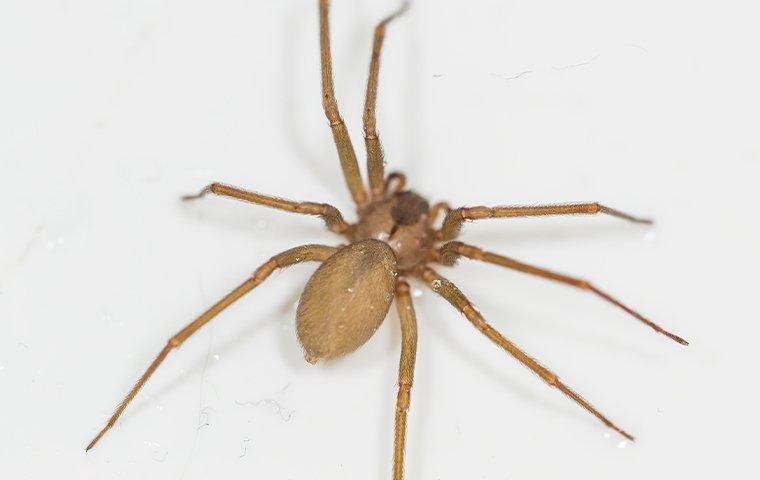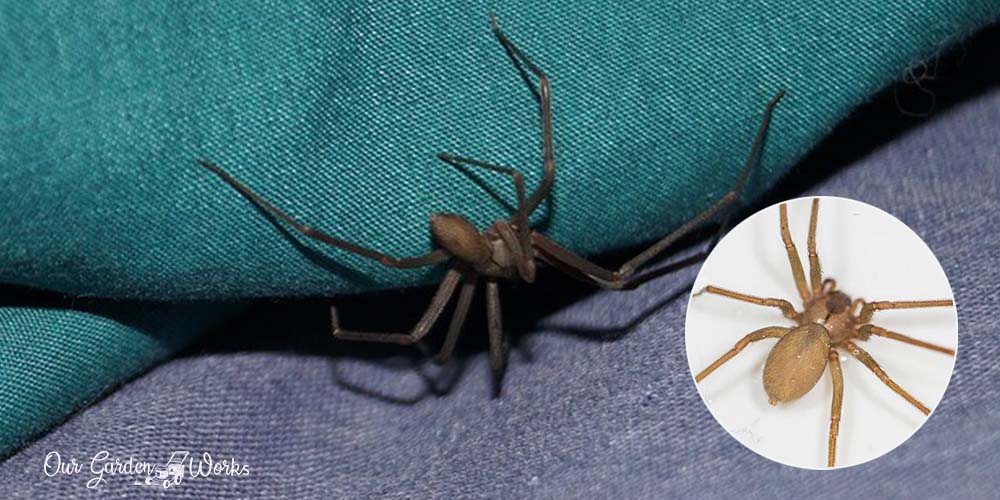The sight of spiders freaks out almost anyone, especially if they are brown recluse spiders. The venom of these small but dangerous insects can cause serious health issues like joint pain. Getting rid of brown recluse spiders is a crucial task to protect your family from their painful bites.
Brown recluse spiders belong to the big 3 spiders which include the other two venomous spiders in the US, black widow and hobo spiders. There are even some incidents where the bite of brown recluse spiders led to the finger amputation of a 19-year-old British teen in 2021.
Despite being non-aggressive, any sighting of a brown recluse spider can pose a threat to any member of the family, even pets.
In this post, we will discuss three steps in getting rid of brown recluse spiders and how to prevent them from going back.
3 Steps in Getting Rid of Brown Recluse Spiders
Brown recluse spiders usually live outdoors. However, they may occasionally take shelter in houses when the weather changes and they are hunting for food. They love cluttered, dark, and undisturbed areas of the house.
They are often found in the southern parts of the US. However, there are now cases of bitten individuals in the northern states. So, regardless of where you are, you should keep yourself safe from them at all costs.
To get rid of brown recluse spiders permanently, here are the three easy steps that you can try:
Step 1: Identify The Kind of Infestation You Have

The first step to keeping brown recluse spiders out of your safe space is to recognize if they are the spiders you have at home. Doing so will help you find the ideal insecticide and methods that will keep them away.
Here are the characteristics of brown recluse spiders:
- Size: They range from ¼ to ½ inches. So, if you find spiders bigger than that, you’re probably dealing with wolf spiders.
- Color: Brown recluse spiders come in different shades of brown with no stripes on their legs. In some cases, some have a yellowish-brown color.
- Eyes: They have six eyes that come in three pairs.
- Markings: The violin markings on the thorax of brown recluse spiders and red marks are their well-known marks. It is also the reason why they are called fiddleback spiders. However, you cannot rule them out using these features because other insects also bear the same markings.
- Habitat: Like other wild insects, brown recluse spiders live and mate under logs, boulders, and woodpiles. However, they can also live in some areas of your house like the garage, attics, or kitchen.
- Feeding behavior: They don’t spin webs to catch their prey. Instead, they wait for the smaller insects to come closer and subdue them using their venom.
- Breeding behavior: Brown recluse spiders produce five egg sacs that they lay on their webs. Each sac contains 50 eggs. They often stay hidden during the day but will occasionally go out when there is overcrowding. So seeing one during daylight is an indication that you have an infestation at home.
- Defensive Behavior: Non-aggressive but will bite as a defense when trapped between two surfaces.
- Venom toxicity: The venom of brown recluse spiders makes them a dangerous spider to have at home. The active enzymes in their venom cause blood vessel damage and tissue death in the bitten area. Their bite doesn’t often cause serious health risks since they only produce a small amount in every bite.
Signs of Infestation
Brown recluse spiders are the solitary type of insects. However, they may breed inside your home and grow multiple spiderlings around your house. To know if you have an infestation, here are some signs to look out for:
- Seeing a brown recluse spider during the day
- Webs with egg sacs in your ceiling or corners
- Unusual bites and blisters in your body that comes with nausea or joint pain
- Pets get sick or paralyzed out of the blue.
If you notice any of the signs above, you can tell that brown recluse spiders are lingering around your house, waiting for an opportunity to bite.
Step 2: Seal, Clean, and Find Their Hideout

Spider, in general, loves living in the cluttered areas of your home because that’s also a bug-highway. They often take shelter during the colder months in unheated garages and find their food where there is plenty.
The second step after identification is to get rid of their potential hideouts. You should:
- Seal window sills and cracks in the wall
- Clear out the piles of wood around the perimeter of your house
- Mow your lawn and get rid of tall grasses
- Fill the gaps between your door and floor using a door seal
- Declutter your garage by placing everything in big plastic containers and stacking them on a shelf. Get rid of the things that you no longer use.
- Vacuum the undisturbed areas in the house like the attic and basements.
- Get rid of spider webs in the following areas:
- Ceiling
- Corners of the house
- Cupboards
- Chandeliers
- Under the bed and furniture
- Above tall cabinets
- Behind paintings
- Wipe surfaces of potential spider hideouts with peppermint oil to naturally repel the spiders out.
Step 3: Wipe Out The Brown Recluse Spiders in Your Home Using Insecticides

As you clean your house, you will notice where brown recluse spiders hang out through their webs. You may even see them running into holes or cracks in the walls.
The last step is to kill them off with an insecticide. Homemade insect repellents and repellents don’t kill spiders. They only repel for a few days and their back again in their hideout.
Using synthetic insecticides indoors is safe as long as you only apply them where the spiders frequent and allow the solution to dry.
The effective pest control for brown recluse spiders usually contains bifenthrin, cyfluthrin, deltamethrin, and lambda-cyhalothrin, which are subclasses of permethrin. The best ones that you can try are:
- TERRO Insect Killer Aerosol Spray
- Compare-N-Save Concentrate Indoor and Outdoor Insect Control
- CSI Bifen L/P Insecticide Granules
If you are not a fan of chemical sprays inside your home, you may use sticky traps or organic contact insecticides like diatomaceous earth and vinegar solution.
However, the brown recluse must touch the solution or dust before it takes effect on them. So, there is a slower effect in using these organic approaches.
Tips in Preventing Brown Recluse Infestation at Home
Once you killed all the hiding brown recluse spiders in your house, you should keep them outdoors by trying any of the following tips:
- Place aromatic eucalyptus and hedge apples in the potential entryways of brown recluse spiders. They hate the smell of it as well as the smell of other essential oils like:
- Peppermint
- Tea tree
- Lavender
- Lemongrass
- Mint
- Catnip
- Lemon balm
- Basil
- Rosemary
- Maintain routine pest control to keep bugs away from your house. Though bugs are harmless, they invite more dangerous predatory insects into your house.
- Select a few lights that you will keep on at night to discourage small insects from going to your house at night.
The Impact of a Brown Recluse Spider Bite on Your Health
The bite of brown recluse spiders is no joke. They may not sting for a few hours. However, other symptoms may occur as soon as the venom spreads around the area. If you have a bite from these crawlers, make sure to prevent infection and clean the area immediately.
The mild symptoms of a brown recluse spider bite include:
- Swelling, itchiness, and pain in the bitten area
- Muscle pain
- Skin sores or blisters
- Joint pain
- Nausea
- Chills
- Fever
When the bite of the brown recluse spider is left untreated or sanitized, it can lead to infection and gangrene. In worst cases, the infection can spread throughout the body and lead to sepsis or infection of the blood. In rare cases, it can also lead to seizures and coma.
You should contact a medical professional when your child is bitten by the brown recluse spider or an adult was bitten and experiences any of the following:
- Difficulty breathing
- Extreme pain
- Darker blisters around the bitten area
- Infection around the bitten area
Aside from harm to humans, brown recluse spiders are deadly to dogs and other pets. Their venom can cause kidney failure and paralysis in small dogs and kill them eventually.
Frequently Asked Questions (FAQs)
How can you tell if a spider is a brown recluse?
You can tell that a spider is a brown recluse when it is brown from its body to its legs. It is also ½ to ¼ inch in size and does not spin webs to catch prey but runs after them. You won’t also see them in groups, and they only spin webs for the egg sacs.
Should I be concerned if I find a brown recluse spider?
Yes, especially if you saw it in broad daylight. Brown recluse spiders are nocturnal insects, and seeing one during the day indicates that there are a couple of them around your house. They only come during the day when they are hungry, and there is overcrowding on where they are hiding.
How can you tell the difference between a brown recluse and a house spider?
The house spider and brown recluse differ in the markings on their thorax. Brown recluse spiders have a violin-shaped marking on their back, while house spiders have a dark patch of brown on their back.
Can a brown recluse spider kill you?
Brown recluse spider bites can be deadly to some individuals, especially kids. Their venom can cause a systemic breakdown of red blood cells that is deadly for children. There’s no antivenom in the US for their bites, leading to critical medical conditions and death.
What are the effects of a brown recluse spider bite?
Blisters, pain, and dark lesions around the bitten area are some of the symptoms of a brown recluse spider bite. You may also experience nausea and muscle and joint pain.
What keeps brown recluse spiders away?
Brown recluse spiders hate the same things like other spiders. They don’t like the intense aroma of hedge apple and herbs like:
- Peppermint
- Tea tree
- Lavender
- Lemongrass
- Mint
- Catnip
- Lemon balm
- Basil
- Rosemary
What should I do if I find a brown recluse in your house?
At first sight of these crawlers, getting rid of brown recluse spiders is the best thing to do. Since they are tiny, you can crush them with a slipper or anything.
Then, start decluttering and cleaning your house to keep them from coming back into your house. Maintain an annual pest control in your house, especially if you often notice them outdoors.
What will eat brown recluse spiders?
Birds, praying mantis, and crickets eat brown recluse spiders. In the outdoors, many predators will munch on them. So, they stay under rocks and logs during the day.
What time of year do brown recluses most active?
According to the researcher from Kansas State University, brown recluse spiders are active from March to October. Controlling them during these months may not be efficient since they will keep coming. So, you should start cleaning up and sealing your house from September to April.
Final Thoughts
Getting rid of brown recluse spiders, at the very sight of them in your house, is the best way to keep your kids and pets safe from their powerful bites.
You should not risk them having around since they will not think twice about biting anyone. Also, maintain a clutter-free home and make sure to perform a yearly pest control to keep the bugs away from your humble home.
If you find this post informative about brown recluse spiders, please don’t forget to share it with your friends. Also, share your horrifying experiences with brown recluse spiders and how you handled the situation in the comments below.

I was told that Brown Recluse Spiders do not clean there feet like other spiders. The effects of this behavior means that the insecticide they walk through is NOT ingested. Was bitten bad a few years ago and was told of this when I wanted to spray to eliminate them.